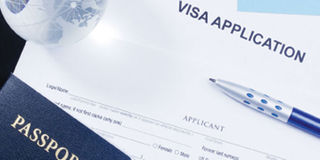It’s keeness, honesty that get you the visa

PHOTO | FOTOSEARCH
One of the most dreaded parts of the journey to study abroad is to obtain a visa. Stories about long queues and gruelling interviews, at the end of which a visa is denied without a clear explanation, intimidate many.
Fortunately, this is not how student visa applications work. If you can, seek the assistance of a professional who is registered with the embassy, or one who works with reputable universities. These people handle student visa applications daily. They are familiar with the various immigration laws.
A common query among applicants is: Why do foreign embassies ask for so many documents to process a visa?
Well, it is because they want to ensure that only genuine students enter their countries. They want to know that you are indeed going to study, not exceed allowed work hours, that you have the financial means to pay for your studies and living expenses while you are there, and that you will return home upon completion of your studies.
If you research and prepare well, the handling of your visa application will be straightforward. The job of the immigration desk at an embassy is to allow genuine visitors entry and to deny unscrupulous characters.
Before you apply for a visa, have a look at the embassy’s website to get information on how to apply. Some will require that you complete and submit an application online. At the same time, you will be required to book an appointment to submit your documents in person and to pay the application fee, and possibly have your biometrics taken. There might be an interview too.
Others will ask you to print an application form, complete it by hand, and then make an appointment to submit supporting material.
When it is time to book an appointment, seek an early time to avoid being caught up in any delays that might arise due to backlogs from earlier applications.
Get to the venue in plenty of time. Be well dressed and groomed. First impressions count. Keep all your documents in order so that you do not waste time shuffling papers when asked to produce a specific one.
Find out how the application fee is to be paid. Do you have to make a deposit at a bank? Pay by banker’s cheque? Pay cash? Each embassy has its own requirements. Do not assume that what one embassy does or requires will be the same for where you are applying.
What are the specifications for the passport-size photographs? Again, each embassy has its own requirements and these will be clearly documented in the application procedures.
If you deliver the wrong size, your application may not be accepted. Concerning supporting documents, a list will be provided. These will include proof of financial ability and that you are a genuine student.
Usually for proof of financial ability, you will need to submit bank statements from your sponsor. Again here, remember that each embassy will have specific requirements. Please make sure that you have researched this area well to submit what is required.
Do not let anyone lend you their bank statements. Most embassy’s have a way to verify your documents. If any of them is found to be false, your application will be turned down and an exclusion period imposed before you can apply for a visa again.
To prove that you are a genuine student, embassies look at your educational background, how long you have been out of school, and what you have been doing during this time. They check the relevance of the course against your background. They also investigate if you have been denied a visa before and if you are applying to a genuine school. They assess your sponsor, among other details.
The documents they ask you to submit usually reveal a lot. For example, if you already have a Masters degree and you are applying for a diploma course, there may be some queries. If a family friend is sponsoring you, the embassy staff might want to know why your parents are not. For many of these areas, as long as you can justify them, the embassy will be satisfied.
How long will the visa process take? Make sure that you submit your application in good time before the commencement of orientation so that your visa will be ready on time.
Find out if you need to take a medical examination, English language test, or an interview. All of these can add to the visa processing time.
Be honest and genuine in your application. If the embassy issues you with a visa and later finds out that you had submitted false information, they can cancel the visa and ask you to leave their country.
The writer is a director of the International Education Centre



